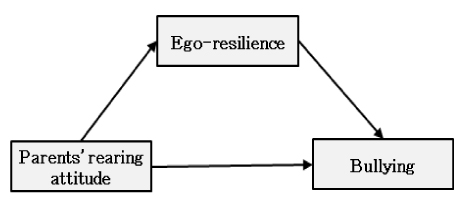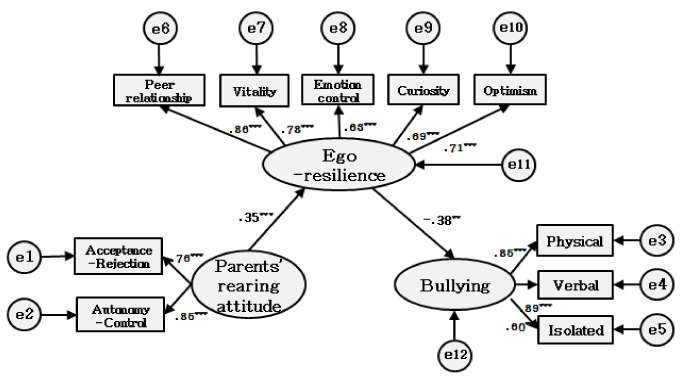J Korean Acad Community Health Nurs.
2013 Jun;24(2):214-224. 10.12799/jkachn.2013.24.2.214.
Influence of Parents' Rearing Attitudes Perceived by Bullied Children on Bullying: Ego-Resilience Mediation
- Affiliations
-
- 1College of Nursing, Kyungpook National University, Daegu, Korea.
- 2Department of Nursing, Taegu Science University, Daegu, Korea. Kimny@tsu.ac.kr
- KMID: 2292764
- DOI: http://doi.org/10.12799/jkachn.2013.24.2.214
Abstract
- PURPOSE
This study was conducted to examine effects of parents' rearing attitudes perceived by bullied children. The focus in this study was on mediating effects of ego-resilience.
METHODS
Data were collected from 202 bullied elementary school students in grade years 5 and 6. The data were analyzed by using descriptive statistics, correlation analysis and structural analysis with the SPSS/WIN 19.0 program and Amos 19.0.
RESULTS
First, significant positive relations between parents' rearing attitudes and ego-resilience, significant negative relations between ego-resilience and bullying, and between parents' rearing attitude and bullying were found. Second, the effects of ego-resilience as a mediator between perceived parents' rearing attitudes and bullying were significant statistically.
CONCLUSION
The findings suggest that educational programs for parents are needed to improve parents' perception of the importance of their rearing attitudes toward bullying and nursing intervention programs for bullied children should be developed to increase their ego-resilience.
Keyword
Figure
Reference
-
1. Adolescent Violence Prevention Foundation. 2011 The actual condition of school violence. 2012. 04. 23. Retrieved August 8, 2012. from http://blog.naver.com/bakbht?Redirect=Log&logNo=156204036.2. Block JH, Kremen AM. IQ and ego-resiliency: Conceptual and empirical connections and separateness. J Pers Soc Psychol. 1996. 70(2):349–361.
Article3. Browne MW, Cudeck R. Bollen KA, Long JS, editors. Alternative ways of assessing model fit. Testing structural equation models. 1993. Newbury Park. CA: Sage;136–162.
Article4. Chae SK, Song YH. The characteristics of a child who has difficulties in peer relation. J Play Ther. 2004. 8(2):1–13.5. Choi ES, Chae JH. A study of psychological factorsassociated with bullying. Underst People. 2000. 21:109–137.6. Choi YJ, Jhin HK, Kim JW. A study on the personality trait of bullying & victimized school children. J Child Adolesc Psychiatry. 2001. 12(1):94–102.7. Ha MS, Lee SB. The influence of the children-perceived parents' rearing attitude and self elasticity to adjustto school life. J Child Educ. 2009. 18(3):247–258.8. Hong SH. The criteria for selecting appropriate fit indices in structural equation modeling and their rationales. Korean J Clin Psychol. 2007. 19:161–177.9. Hur JY. A study on the relationship among adolescents' resilience, peer relation and facilitative communication competence. 2004. Seoul: Seoul Women's University;Unpublished master's thesis.10. Jackson DL. Revisiting sample size and number of parameter estimates: Some support for the N:q hypothesis. Struct Equ Modeling. 2003. 10(1):128–141.
Article11. Jung HN, Cho OK. The role of empathy and self-esteem between parents' parenting behavior and attitudes on bullying. Gyoyugirongwasilcheon. 2011. 21:87–114.12. Khu BY. Causes and prevention of bullying on adolescents(29). 1999. Seoul: Korea Youth Counselling & Welfare Institute.13. Kim JS. The Relations among the classroom climate, the ego-resilience, and the school adjustment perceived by elementary school children. 2009. Daejeon: Chungnam National University;Unpublished master's thesis.14. Kim HW. Psychological and school maladjustment resulted by peer rejection and peer victimization among elementary, middle, and high school students. Korean J Youth Stud. 2011. 18(5):321–356.15. Kim KS, Kim HK. A study on relation between perceived parental rearing attitude and self-esteem and egoresilience of high school students. J Educ Res. 2011. 19(2):143–170.16. Ku HM, Hwang ST, Kim JH. The personality traits of ego resilients. Korean J Clin Psychol. 2001. 20(3):569–581.17. Lee EY. The mediating effect of the ego-resilience on the relationships between mother's communication style and peer relationship. 2012. Seoul: Sookmyung Women's University;Unpublished master's thesis.18. Ministry of Education, Science and Technology. 2012 The Actual condition based on complete enumeration survey. 2012. Retrieved June 9, 2012. from http://www.mest.go.kr/web/45859/ko/board/view.do?bbsId=294&boardSeq=30338.19. Olweus D. Aggression in the schools: Bullies and whipping boys. 1978. Washington, DC: Hemisphere.20. Park EH. The relationships between ego-resiliency, IQ and academic achievement. 1997. Daejeon: Chungnam National University;Unpublished master's thesis.21. Park EH. The influence of rearing attitude of parents and social support on adjustment in school of children from multicultural families. 2010. Daegu: Kyungpook National University;Unpublished master's thesis.22. Park JW. A study on the ecosystematical factors victimization behaviors among elementary school students. 2005. Seoul: Seoul National University;Unpublished master's thesis.23. Park JY, Chae KM. The role of parenting behaviors, child`s communication and problem solving skills in bullying/being bullied. Korean J Psychol Gen. 2011. 30(1):45–67.24. Pontzer D. A theoretical test of bullying behavior: Parenting, personality, and bully/victim relationship. J Fam Violence. 2010. 25(3):259–273.25. Roh ES. The mediating effects of ego-resilience on the relationships between children's perception of parenting attitudes and peer relationship. 2010. Seoul: Sookmyung Women's University;Unpublished master's thesis.26. Rohner RP. The warmth dimension: Foundation of parental acceptance and rejection theory. 1991. NY: Sage Publication.27. Rutter M. Resilience in face of adversity: Protective factors and resilience to psychiatric disorder. Br J Psychiatry. 1985. 147:598–611.28. Sobel ME. Asymptotic confidence intervals for indirect effects in structural equation models. Sociol Methodol. 1982. 13:290–312.
Article29. Song HR. The relationship between the group ostracizing and adolescent's ego-resiliency and school-adjustment. 2010. Seoul: Sungkyunkwan University;Unpublished master's thesis.30. Sung YH. The effects of parental social support system on children's behavior. 1993. Seoul: Ewha Womans University;Unpublished doctoral dissertation.
- Full Text Links
- Actions
-
Cited
- CITED
-
- Close
- Share
- Similar articles
-
- Comparison of Child-rearing Attitudes of Parents and Problem Behavior of Children as Perceived by Parents and Children
- The Effect of Bullying Victimization on Depressive Symptoms in Adolescents : Focusing on the Moderating Effects of Resilience
- The Influence of Parental Behavior on Ego Resilience of Korean Middle School Student
- Influence of Parents' Child Rearing Attitudes on Family Cohesion and Self-esteem in Adolescents
- Influence of Ego-resilience and Social Support on the Depression of Hospital Nurses




